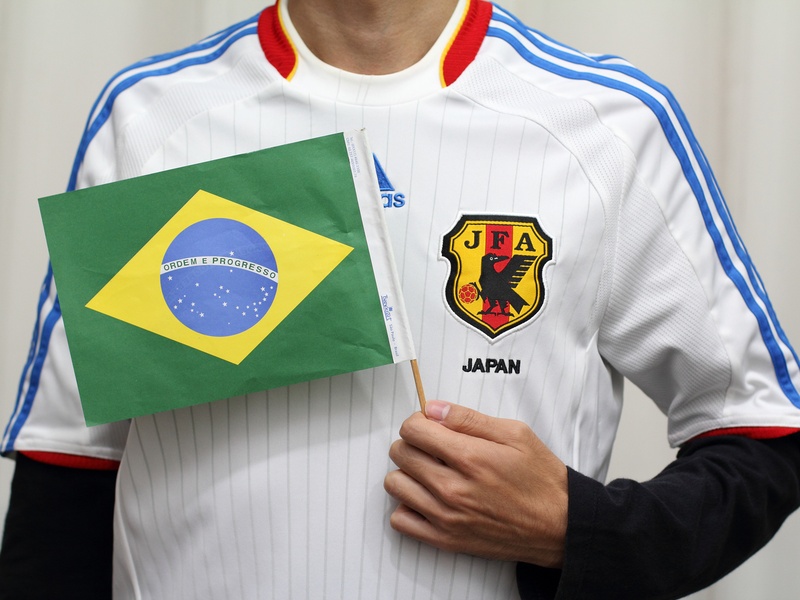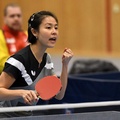In August 2016, Rio de Janeiro will host the Summer Olympic Games. As the athletes prepare to compete, I prepare to once more answer the question: “Will you support Brazil or Japan?”
This question doesn’t bother me. In a country with so many immigrants, it is natural that many of them will support the country of their ancestors in sporting events. During the World Cup, people gather to watch the games of both Brazil and their homeland.
Soccer Mania
In Brazil, men’s soccer is by far the most popular sport. My earliest World Cup memory is from 1986, when I was only six years old. I remember watching the last two matches of the Brazilian team. At that time, I understood the concept of victory and defeat, but that was about it. It wasn’t until the 1990 and 1994 games, when I was almost a teenager, that I became very excited about the sport, along with most other boys my age.
For the 1998 World Cup in France, a new scenario arose: for the first time, Japan would play a World Cup. This was also when people began asking me which team I would support. My standard answer was to support both until they played each other; if that happened, I would cross that bridge when I came to it.
In 2002, when the World Cup was held in Japan and South Korea, the Japanese team’s performance improved and my support for them grew stronger. At the same time, I began to feel less excitement toward the Brazilian team. At that point, however, Brazil and Japan had yet to meet each other on the field.
Nine years earlier, in 1993, São Paulo’s soccer team played against Milan’s for the Intercontinental Cup at the Olympic Stadium in Tokyo. On a banner was written the declaration “Let’s meet here in 2002,” referring to the 2002 World Cup. I remember being very impressed with such advance planning; the next millennium sounded so distant and futuristic.
At the 2006 World Cup in Germany, Brazil arrived as a five-time champion. Unfortunately, the team’s overconfidence resulted in their early elimination. It was in this tournament that Brazil and Japan finally played against each other. The final score was 4:1 in favor of Brazil. During that game, I realized that I was now totally behind the Japanese team.
During the 2010 and 2014 World Cups, both held in Brazil, I wore the Japanese team’s shirt to work and on outings with friends. No one complained. The two teams did not play against each other in either of those tournaments.
The Olympics Offer More Options
When it comes to the Olympics, my support is well-balanced between Brazil and Japan, and is not limited to those two countries. The Olympics are nice because unlike World Cup soccer, there are many different sports and athletes to root for. Sometimes I’d root for athletes from other East Asian countries, like Korea and China; in Brazil, Asians are in the minority and are rarely visible in popular culture. I also supported South American teams because after all, they are our neighbors.
Brazil tends not to have strong representation at the Winter Olympics; thus, I am free to throw all my support behind Japan. I like to watch figure skating, ski jumping, bobsledding, and curling. In the end, the most important thing is to enjoy the excellence of the athletes. Some people like to support the efforts of the underdogs, while others enjoy the dominance of the favored teams.
The fact that Tokyo will host the 2020 Olympics certainly has relevance for the relations between Brazil and Japan. At the end of the 2016 Games in Rio de Janeiro, there will be a special presentation for the next Olympics, at which the national anthems of Greece, Brazil, and Japan will be played.
The Japanese National Anthem
It was through watching sports ceremonies that I learned Japan’s national anthem, “Kimigayo.” It is curious that the Brazilian national anthem is about three minutes long (usually, only half of it is played on TV) while Japan’s is less than one minute.
On certain occasions, it was important for me to know the lyrics to “Kimigayo.” The anthem was constantly played at Nikkei association events and at celebrations of the 2008 Centennial of Japanese Immigration in Brazil. I was able to help the people who did not know the song; I explained what I understood about its meaning.
The same goes for Hinomaru, the Japanese national flag. The image of the red circle on a white background is well known in Brazil. During sporting events, many people ask me what it means.
Team Affinity
Supporting a team or an athlete is an emotional undertaking. In the case of Japanese teams, there is an obvious affinity for me based on shared ancestry. Even if I know little or nothing about the Japanese athletes, just the fact that they represent the land of my ancestors is enough to garner my support.
In Brazil, the Nikkei population is relatively small, comprising about one percent of the total population. It is rare to see a Nikkei participating in the country’s popular sports. Thus, the mere mention of a Japanese name tends to attract Nikkei support—even if it is spelled wrong by local broadcasters.
Fortunately, team competitions do not generally lead to violent confrontations. If a Brazilian roots for another team, the most likely response is some jokes.
Japanese teams and athletes also attract fans from among the non-Japanese population—as long as they are not playing against Brazil. They have a reputation for excellent effort and concentration, which can make up for any lack of skills. After the 2014 World Cup, Japanese fans were seen picking up trash at the stadium, which made for a lot of goodwill.
Team Support
When I wear my Japanese soccer jersey, no one is surprised or angry. Most people praise the color and design. Nonetheless, as a precaution, I would never wear it after a Japanese victory against Brazil.
I realize there is a possibility for my support of Japanese teams to be misinterpreted. Nikkei are often seen as foreigners in Brazil, and walking around in a Japanese team jersey would only reinforce that image, I think.
Ultimately, however, my support of Japan in sports presents no problem. Brazil is a country with many immigrants; many have roots in Africa, Europe, Asia, etc. We are fortunate to be able to enjoy many cultures and also support multiple sports teams and athletes. In the end, our overall experience and appreciation of sports is only enriched.
© 2016 Henrique Minatogawa






